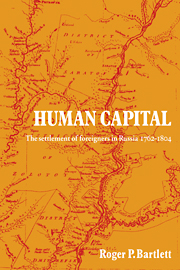Book contents
- Frontmatter
- Contents
- Weights and measures
- Abbreviations
- Preface
- Introduction
- I Antecedents
- 2 Catherine II and the Manifestos of 1762 and 1763
- 3 The response: settlement 1763–1775
- 4 Southern Russia 1764—1796
- 5 Urban and entrepreneurial settlement under the 1763 Manifesto
- 6 Immigration and colonies 1797–1804
- Conclusion
- Appendices
- Notes
- Bibliography
- Index
- Frontmatter
- Contents
- Weights and measures
- Abbreviations
- Preface
- Introduction
- I Antecedents
- 2 Catherine II and the Manifestos of 1762 and 1763
- 3 The response: settlement 1763–1775
- 4 Southern Russia 1764—1796
- 5 Urban and entrepreneurial settlement under the 1763 Manifesto
- 6 Immigration and colonies 1797–1804
- Conclusion
- Appendices
- Notes
- Bibliography
- Index
Summary
The new rules of 1804 on immigration did not remain long without modification. In 1810 the pressures of the Continental blockade and the Turkish war led to a cessation of all financial help to immigrants; in 1819 a ‘temporary’ ban marked the end of the large–scale immigration previously encouraged. The final cessation of government–sponsored immigration on the existing pattern in the 1830s was followed shortly by the subordination of the established colonies to the Ministry of State Domains. Further immigration later in the nineteenth century took place on different bases.
The rules of 1804 focussed firmly on the cultural and didactic role of foreign settlers. This role was consequently taken as a starting point by many nineteenth–century observers when commenting on immigration policies in the eighteenth. Philip Vigel, for example, wrote sneeringly of efforts under Catherine ‘to establish European culture– in Russia through foreign settlement, and of the ‘whole masses of light’ which were to ‘pour in upon us with thousands of German yokels (muzhikovy)’. But as we have seen, Catherine's purpose was not primarily to recruit Europeans, or to find foreign teachers for her subjects, although the opportunity to use settlers for the improvement of agricultural techniques and to encourage new industrial production was not overlooked.
- Type
- Chapter
- Information
- Human CapitalThe Settlement of Foreigners in Russia 1762–1804, pp. 230 - 236Publisher: Cambridge University PressPrint publication year: 1979



